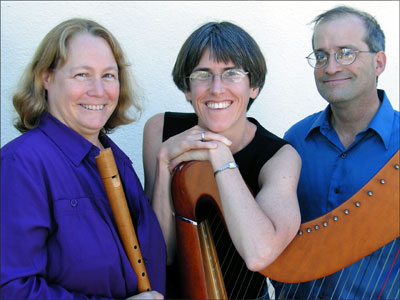|
The name Briddes Roune (BREE-dess RONE) is Middle English for bird song/conversation/speech
and is a reference to the fact that two of the three of us are named Robin. I
formed Briddes Roune specifically to record early medieval English songs, a
repertoire I have been singing for several years. As anyone who's read Chaucer
aloud knows, Middle English has a delightfully musical lilt, making it a fun
language to sing, and the English fondness for thirds and sixths gives the music
a sweetness that is unusual for that time.
This recording includes the songs of St. Godric, who claimed that all of
his songs came to him in visions. For example, during a vision in which
he saw Mary Magdalene and the Virgin Mary, the Virgin taught him "Sainte
Marie viergene," saying that if he found himself in pain or tired or
succumbing to temptation, he should sing this song and she would come
quickly to his aid. Godric died in 1170, making these songs the earliest
songs in English with extant melodies. More on St. Godric can be found in
the liner notes.
I am particularly drawn to the songs without fixed rhythms. The rhythms of
songs such as "Stond wel, moder, under roode" and "Ar ne kuth, ich sorghe non"
are driven by the speaking rhythms of the words and by musical intuition. I
like the improvised quality of these songs, and I enjoy the extra opportunity to
express the text.
Performing medieval music involves some challenges not faced by those interested
in later music. Instrumental accompaniments were almost never written down, and
even the choice of instruments used was quite free. What you hear on this
recording is very much our own arrangement. Our instrumental parts arise from a
combination of planning and improvisation. Instrumental countermelodies are
generally written out in advance by either Kathryn or myself. Drone parts are
generally worked out in rehearsal. The process goes something like this:
Kathryn: How about this?
Robin S.: ...mmm...no...maybe an A? ...no...a D? ...no....
Kathryn: What about this?
Robin S: Yeah, that's best.
Kathryn: That's what I played originally.
All instrumental preludes and interludes are improvised.
In addition to the challenge of writing our own instrumental parts, very few
English songs have survived with their melodies, although we have many lyrics.
For the surviving melodies, I have used E.J. Dobson and F. Ll. Harrison's book,
Medieval English Songs. For others (e.g. Lenten is come, Lutel wot hit
any mon), I have set lyrics in the style of that time and place. I typically start by
choosing a mode, which defines what notes are in the scale and which are most
important, and then I start playing with the words, improvising tunes. When I
get a fragment that I like, I write it down, and gradually the piece begins to
take shape.
| |

![Lenten is come by Briddes Roune [Lenten is come by Briddes Roune]](http://he3.magnatune.com/music/Briddes%20Roune/Lenten%20is%20come/cover_200.jpg)
Lenten is come
|

![[Magnatune : we are not evil]](http://he3.magnatune.com/images/m3/inside_magnatune_logo.gif)
![[Free trial: only $15 per month]](http://he3.magnatune.com/images/m3/inside_mascot.gif)
![[login]](http://he3.magnatune.com/images/m3/login_btn.gif)
![[info]](http://he3.magnatune.com/images/m3/info_btn.gif)












![[Magnatune : we are not evil]](http://he3.magnatune.com/images/m3/inside_magnatune_logo.gif)
![[Free trial: only $15 per month]](http://he3.magnatune.com/images/m3/inside_mascot.gif)
![[login]](http://he3.magnatune.com/images/m3/login_btn.gif)
![[info]](http://he3.magnatune.com/images/m3/info_btn.gif)










